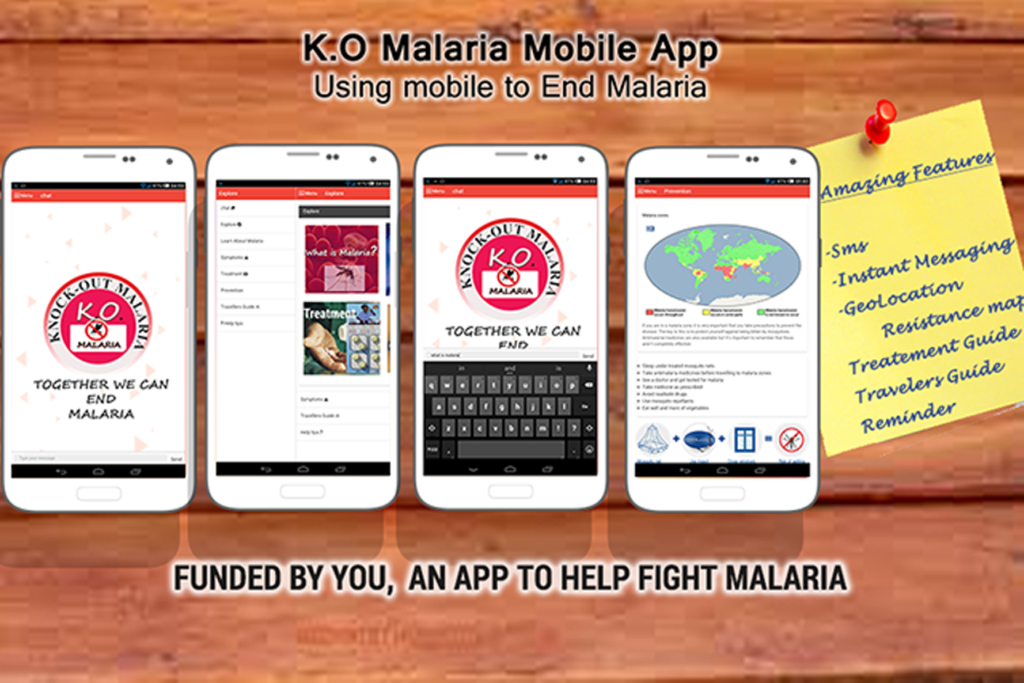Though its death toll is dropping, Malaria still remains one of the world’s deadliest diseases, responsible for 500,000 deaths in 2013, which is smaller than the recorded statistics for 2010, which stood at 655,000, according to the Center for Disease Control and Prevention. Malaria is a preventable and treatable blood disease caused by a parasite, and carried from person to person by some types of mosquitoes.
There has recently been an increase in the number of malaria-related apps, with more and more start-ups trying to use technology to sensitize, diagnose, or attempt prevention altogether. One of the most popular apps is Lifelens, which uses an algorithm to analyze a drop of blood, after a sample is applied to a slide with a dye containing a specialized magnification lens, revealing which, if any, cells are infected with the malaria parasite.
This process can be very complicated for the uninitiated, and this is where the KO Malaria App becomes relevant. KO Malaria App is an easy-to-use app which provides 24/7 assistance to potential malaria patients, and includes a geo-location feature which gives personalized assistance to people depending on the region, as well as prevention methods.
The KO Malaria App (knock out malaria) is the first product by KamerLabs, a tech start-up based in Bamenda, in the North West region of Cameroon, which was founded in the last quarter of 2014 (though it existed as a moral enterprise for much longer) by Ian KiKu and Asong Celine. “KO Malaria is a mobile application designed to provide assistance and support to inhabitants living in Malaria endemic regions, as well as those travelling to and from such regions across the world.” Says Ian.
This application, which is not yet available for download on app stores, was among the finalists of the 2014 African Android Challenge competition, and is currently in a crowdfunding phase on Indiegogo. The beta version has been tested and KamerLabs intends to release the application on multiple platforms. Ian Kiku, the co-founder, says that the reason they launched the crowdfunding campaign is because he wants the “app to be compatible with all the Operating systems, starting with Android, IOS & Blackberry platforms, and others would follow suit.” He added that they also need to “hire additional developers with excellent skills to work on the app and its future versions, and the funds we get will help purchase bulk SMSes, and cloud hosting, among others, thus, making the app available at a cheaper rate in local communities.”
Ian Kiku is a coder based in Cameroon with 4 years of experience in IT fields from computer programming (web and mobile) to hardware maintenance. Ian provides IT support to a number of institutions and he is currently a visiting lecturer at the St. Louis University Institute, Bamenda, where he has been delivering lectures on information technology. According to Ian, they originally intended setting up their start-up in Douala, Cameroon’s economic capital, but ended up choosing Bamenda so that they can contribute to the growth of the tech start-up scene there.
Asong Celine is a final year undergraduate in Medical Laboratory at the Bamenda University of Science and Technology (BUST), and is Kamerlabs’ lead health expert. She met Ian in 2013 when she was working on a research paper on Malaria, and he had an idea to start an app which could reduce the risk of malaria infection through sensitizing people and geo-locating them so they could locate health practitioners, and the KO Malaria App was born. Celine is passionate about science and technology, and she hopes she can use her love for IT to “change the community positively as well as have an impact on the rest of the world.”
The KO Malaria App works online via push notifications, which are regularly sent to subscribers, containing relevant information such as prevention methods, treatment guides, and medication reminders. It also has an offline notification system, for those who do not have access to the internet, which consists in sending SMSes with content similar to that supplied by the push notifications. The app’s geo-location feature locates the nearest hospitals, clinics or pharmacies and compiles a list of available doctors on-call for travellers or anyone to access in malaria regions.
Their profile page for the Indiegogo campaign states that there are more cell phones in the world than toilets, and malaria has killed more people than any war or famine. It further states that an estimated 70% rise in mobile devices is expected by 2017. It is therefore their wish to tap into this rise in the use of mobile devices to help Malaria stricken regions through the development of an app which includes an SMS feature, instant messaging, push notifications, treatment reminders, a geo-localization map and a geo-locator for health facilities (pharmacies, clinics, hospitals and health professionals).
The potential success of the KO Malaria App is directly linked to, and dependent of the rise of mobile devices in Africa, as well as its originality and capacity to stand out in a sea of malaria-related apps. Nevertheless, all of these also depend on the outcome of the crowdfunding campaign, which, whatever the outcome, will not deter Ian and Celine’s passion for tech or the vision of their start-up, which is to contribute to the growth of the tech start-up scene in Bamenda as well as help the community.
